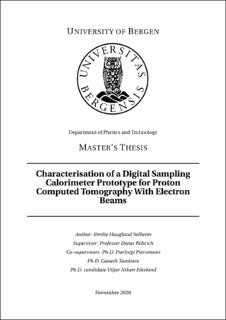Characterisation of a Digital Sampling Calorimeter Prototype for Proton Computed Tomography With Electron Beams
Master thesis
Permanent lenke
https://hdl.handle.net/11250/2720436Utgivelsesdato
2020-12-19Metadata
Vis full innførselSamlinger
- Master theses [170]
Sammendrag
Proton CT is a novel imaging modality designed to improve dose planning and treatment monitoring in proton therapy. The precision of the beam of charged particles, like protons, requires accurate diagnostics, to avoid unnecessary irradiation of healthy tissue. CT measurements using photons can be used to determine the range and stopping power of the particles, but with an uncertainty of 2-3% [1]. It is, therefore, preferable to use proton CT, since it provides a more accurate representation of the range of the beam in the patient. Using technology like the ALPIDE (ALICE Pixel Detector) sensor, developed at CERN for high energy physics, a proton CT system is now under development. The ALPIDE is a Monolithic CMOS Active Pixel Sensor with a pixel matrix of 1024 x 512 sensitive pixels, where each pixel measures 29.24 μm x 26.88 μm; giving better resolution and more accurate determination of particle paths. The ALPIDE can also retain a high data rate, resulting in a short scan time. In this thesis, the focus has been on the characterisation of a digital sampling calorimeter prototype. The properties were investigated based on a test beam experiment at DESY using the Electromagnetic Pixel Calorimeter, EPICAL-2, prototype. EPICAL-2 is composed of 48 ALPIDE sensors, consisting of 24 layers, with two ALPIDE sensors and 3 mm of tungsten absorber per layer. This thesis conducts a systematic study of the sensor performance and the shower profiles at various energies for single and multiple electromagnetic showers in one readout frame. The preliminary results of the data analysis show that the prototype performs as a calorimeter should, i.e. the response scales linearly with the energy of the incoming electron.
